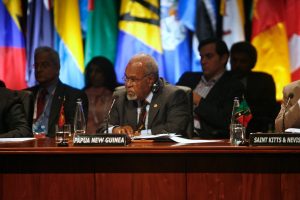Michael Somare, a pivotal figure in Papua New Guinea’s independence and the new nation’s first prime minister, died Friday. He was 84.
Somare was the South Pacific island nation’s longest-serving government leader after it became independent of Australia in 1975. He was prime minister for 17 years during four separate periods.
He died Friday after being diagnosed with a late-stage pancreatic cancer and admitted to hospital on February 19, his daughter Betha Somare said in a statement.
“Sadly, pancreatic cancer is one of the most aggressive cancers that are rarely detected early. We as a family had only two weeks to look for possible treatments for our father,” she said.
“Sir Michael was a loyal husband to our mother and great father first to her children, then grandchildren and great granddaughter. But we are endeared that many Papua New Guineans equally embraced Sir Michael as father and grandfather,” she added.
Somare was born on April 9, 1936, in the city of Rabaul in East New Britain, which was occupied by Japan during World War II. His earliest education was in a Japanese-run school in the village of Karau where he learned to read and write in Japanese.
He was raised the son of a police officer in the province of East Sepik, which he went on to represent in Parliament.
Known as the father of the nation, Somare was pivotal in the South Pacific nation’s move to independence from Australia and was the country’s first prime minister from 1975 to 1980.
Ron May, emeritus fellow at the Australian National University’s Department of Pacific Affairs and a respected Papua New Guinea expert, said Somare was one of the Pacific’s most prominent and respected leaders.
“Papua New Guinea made a smooth transition to independence in 1975, with Somare as prime minister, confounding those in Australia and elsewhere who had predicted political and economic collapse,” May recently wrote.
“It remains one of a fairly small number of post-colonial states that have maintained an unbroken record of democracy,” May added.
Australian Prime Minister Scott Morrison described Somare in a tweet as the “founding father of democratic and independent #PNG and a great friend to Australia.”
On the 30th anniversary of Papuan New Guinea’s independence, Somare said he was generally pleased with his country’s progress.
“I’m happy about the way things have gone but, you know, we could have done better,” he told Australian’s SBS network in 2005.
His last term as prime minister ended controversially in 2011 while he was in a Singapore hospital.
Lawmaker Peter O’Neill successfully moved a motion in Parliament that the prime ministership was vacant. O’Neill was elected prime minister and clung to power despite the Supreme Court twice ruling against him until he was legitimately elected in 2012.
Somare is survived by his wife Veronica and children Bertha, Sana, Arthur, Michael, and Dulciana.
Reporting by Rod McGuirk for the Associated Press from Canberra, Australia.

































